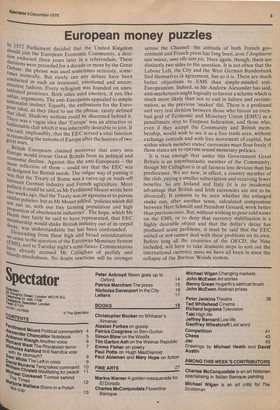European money puzzles
In 1972 Parliament decided that the United Kingdom should join the European Economic Community, a decisdion endorsed three years later in a referendum. These _ecisioas were preceded for a decade or more by the Great !?ehate: the phrase was used sometimes seriously, sometimes ironically. But rarely can any debate have been conducted in such an irrational, emotional and unconstructive fashion. Every syllogism was founded on unestablished prernisses. Both sides used emotive, if you like unfair, arguments. The anti-Europeans appealed to simple nationalist instinct. Equally, the enthusiasts for the EuroP„eno ideal, as they liked to use the phrase, rarely defined mat ideal. Shadowy notions could be discerned behind it. ere was a vague idea that 'Europe' was an attractive or tashionable club which it was inherently desirable to join. It 14,:as said, implausibly, that the EEC served a vital function in reconciling the nations of Europe after the horrors of two
great wars.
British Europeans claimed moreover that entry into
zuroPe would rescue Great Britain from its political and entmlomic decline. Against this the anti-Europeans — the Toro reflective of them — could say that the EEC was designed for British needs. The vulgar way of putting it ‘Lvas that the Treaty of Rome was a carve-up or trade-off uetween German industry and French agriculture. More itely it could be said, as Mr Ferdinand Mount wrote here 870 weeks ago, that the Treaty was an agreement to pursue _ nniar policies: but as Mr Mount added, 'policies which did 'lot suit us, with our tiny farming population and high 113_10P0rtion of obsolescent industries'. The hope, which Mr _eath may fairly be said to have represented, that EEC cimenibership would shake British industry out of its torpid e_cay, was understandable but has been confounded. we escending from these high and broad considerations (.tirne to the question of the European Monetary System mS), and to Tuesday night's semi-fiasco. Commentators '1,4, ye already accused Mr Callaghan of perfidy and ploody-mindedness. No doubt reactions will be stronger
across the Channel: the attitude of both French government and French press has long been, avec l'Angleterre tant mieux, sans elle tant pis. Here again, though, there are distinctly two sides to the question. It is not often that the Labour Left, the City and the West German Bundesbank find themselves in agreement, but so it is. There are much better objections to EMS than simple-minded antiEuropeanism. Indeed, as Mr Andrew Alexander has said, anti-marketeers ought logically to favour a scheme which is much more likely than not to end in failure and recrimination, as the previous 'snakes' did. There is a profound and very real division between those who favour an eventual goal of Economic and Monetary Union (EMU) as a penultimate step to Eurpean federation, and those who, even if they accept the Community and British membership, would wish to see it as a free trade area, without exchange controls and with free movement of capital, but within Which member states' currencies must float freely if those states are to operate sound monetary policies.
It is true enough that under this Government Great Britain is an unenthusiastic member of the Community, though Mr Callaghan is in all fairness less devious than his predecessor. We are now, in effect, a country member of the club, paying a smaller subscription and receiving fewer benefits. So are Ireland and Italy (it is an incidental advantage that British and Irish currencies are not to be divorced). It remains to be seen whether the enlarged snake can, after another tense, calculated compromise between Herr Schmidt and President Giscard, work better than previous ones. But, without wishing to pour cold water on the EMS, or to deny that currency stabilisation is a highly desirable object and that the dollar's decay has produced acute problems, it must be said that the EEC united or not cannot deal with these problems on its own. Before long all the countries of the OECD, the Nine included, will have to take dramatic steps to sort out the international currency mess we have all been in since the collapse of the Bretton Woods system.














































 Previous page
Previous page